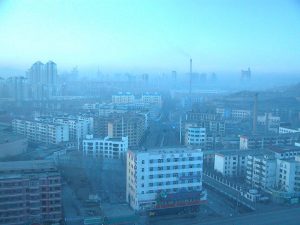On March 26, 2021, the Chinese state media network CGTN broadcast a report in the form of an interview with the Pakistani ambassador to China, Moin ul Haque. During the interview, the envoy explained that he had not seen the slightest evidence of violence perpetrated by the Chinese government in the Xinjiang region. In fact, ul Haque also emphasized that in Xinjiang, Uyghur Muslims have experienced rapid economic advancement, and are allowed to go to school and worship freely.
The Pakistani ambassador’s comments come as no surprise to anyone has observed the country’s recent trajectory of relations with China. While most countries oppose Beijing’s expansive claims in the South China Sea, Pakistan supports the Chinese position on the disputes. Pakistan’s Foreign Minister Mehmood Qureshi recently expressed “Pakistan’s support for the ongoing negotiations of Code of Conduct and underlined that the concerned parties may find a solution through consensus.”
In the same CGTN segment, the Palestinian ambassador to China was shown on a visit to Xinjiang. He said, “there is no conspiracy, there is facts here, the fact is China is rising and developing everywhere including Xinjiang, some people are not happy about that and they would like to stop China by any means.”
Needless to say, these views are very different from those of many other nations. On March 22, the U.S. Treasury Department announced the imposition of sanctions on two Chinese officials, Wan Junzheng, Secretary of the Xinjiang Party Committee and Chen Mingguo, Director of the Xinjiang Public Security Bureau, for their involvement in “arbitrary detention and severe physical abuse, among other serious human rights abuses targeting Uyghurs.”
The following month, U.S. Secretary of State Antony Blinken said in a tweet that “amid growing international condemnation, the People’s Republic of China (PRC) continues to commit genocide and crimes against humanity in Xinjiang.” He added: “We will continue to stand with our allies around the world in calling. for an immediate end to the PRC’s crimes and for justice for the many victims.”
In March, the European Union also imposed sanctions on China over the Uyghur issue. In response, Dolkun Isa, president of the Germany-based World Uyghur Congress, said he was “deeply pleased and grateful” that the EU, describing it a as a “symbolic example of the EU’s recognition of the Uyghur genocide being committed by China.” The EU has also taken actions to prevent the import of cotton produced by forced labor in Xinjiang.
The CGTN segment mentioned above demonstrates now Beijing government is trying to obscure the nature of its policies in Xinjiang by courting Muslim-majority countries, especially in the Middle East.
This is part of Beijing’s broadening engagement with the Arab world, as demonstrated by the convening of the inaugural China-Arab Cooperation Forum in June of last year. Meeting via teleconference, China and Arab League member states promised to adopt the Amman Declaration, among whose aims is the eradication of Islamic extremism. In addition, a report from Xinhua News stated, the two sides agreed to “denounce terrorist activities in all forms, actively combat extremist ideology, acts of terrorism and incitement to terrorism, eradicate the root causes of terrorism, and cut off its sources of funding.”
On April 1 of this year, China’s Foreign Minister Wang Yi embarked on a diplomatic tour to Saudi Arabia, Turkey, Iran, the United Arab Emirates (UAE), Oman, and Bahrain. During the visit, Wang asserted Beijing’s expectation that these countries respect China’s interests, avoid interfering with its domestic politics, and support it when it faces Western criticism. In particular, he thanked Arab support of China’s “counterterrorism measures” against Uyghur Muslims in Xinjiang. “The situation of a country’s human rights shall be judged by its people rather than other countries based on their own preferences,” he said, claiming that “the views of human rights held by some Western countries are not representative of the international perspective.” Indeed, countries like Saudi Arabia have expressed support for Beijing’s Xinjiang policy and have pledged to continue to adhere to a policy of non-interference in other nations’ domestic affairs.
China’s campaign to influence Middle Eastern and Muslim opinion on the situation in Xinjiang is unsurprising. In a recent article, Haisam Hassanein of The Washington Institute wrote that Xinjiang region “has been of strategic importance to China because it served as a bridge to Central Asia and the Middle East.” After 2011, however, “China began to worry that the unrest sweeping the Arab world could have ripple effects in Muslim areas of northwest Xinjiang, encouraging the province’s existing separatist movements to push harder for independence.”
If successful, China’s influence campaign will not only worsen the conditions for the Uyghurs of Xinjiang; it will also produce two diametrically opposed views of the situation there, divided largely along geopolitical lines. As it stands, there is the possibility that other Muslim countries will follow the Pakistani and Palestinian line, diluting international condemnation and allowing Chinese wrongdoings in Xinjiang to continue.
In this context, under President Biden, the United States should not simply impose sanctions on those responsible for Beijing’s repression in Xinjiang; it should also bring the issue up in its diplomatic communications with its Muslim and Middle Eastern partners.

































